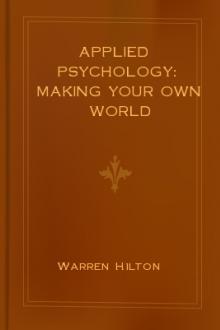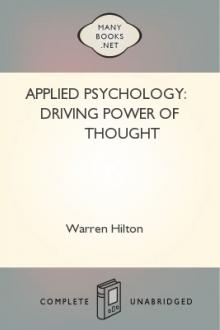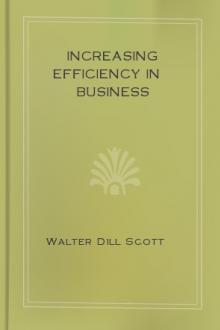Applied Psychology: Making Your Own World - Warren Hilton (good books to read .TXT) 📗

- Author: Warren Hilton
- Performer: -
Book online «Applied Psychology: Making Your Own World - Warren Hilton (good books to read .TXT) 📗». Author Warren Hilton
External objects excite sensory impressions, but the perception of them is purely at the option of the mind.
This is of the greatest practical importance. Consider its consequences. It means that sense-impressions and your perception of them are two very different things. It means that sense-impressions may throng in upon you as they will. They are the work of external stimuli impressing themselves upon the sensorium as upon a mechanical register. You are helpless to discriminate among them. You cannot accept some and exclude others. You are a perambulating dry plate upon which outside objects produce their images.
But, and this is a vital distinction, perception is an act of the mind. It is initiated from within. It permits you to discriminate among sensations in the sense that you may dwell upon some and ignore others. It enables you to definitely select, if you will, the elements that shall make up the content of your consciousness.
Perception as an independent mental process thus enables you to predetermine what elements of passing sensory experience may be made the basis of your conscious judgments and of your feelings and emotions.
Bear this in mind when you think of your environment and its supposed influence upon your life. Remember that your environment is no hard-and-fast thing, an aggregate of physical realities. Your environment, so far as it affects your judgment and your conduct, is made up, not of physical realities, but of mental pictures.
Your environment is within you. Get this conclusion clearly in your mind.
Hold fast to the point of view that, Environment, the environment that influences your conduct and your life, is not a chance massing of outward circumstances, but is the product of your own mind.
Think what this means to you. It means that by deliberately selecting for attention only those sense-impressions, those elements of consciousness, that can serve your purpose, you can free yourself from all distractions and make peaceful progress in the midst of turmoil.
"In the busiest part of New York, a broker occupied a desk in a room with six other men who had many visitors constantly moving about and talking. The gentleman was at first so sensitive to disturbances that he accomplished almost nothing during business hours, and returned home every evening with a severe headache. One day a man of impressive personality and extremely calm demeanor entered the office, and noticing the agitated broker, smilingly said: 'I see that you are disturbed by the noise made by your neighbors in the conduct of their affairs; pardon me if I leave with you an infallible recipe for peace in the midst of commotion: Hear only what you will to hear.' With this terse counsel he quietly bade the astonished listener adieu. After his visitor had departed, the nervous man felt unaccountably calm, and was constrained to meditate upon his friend's advice, and no sooner did he seek to put it into practical use than he learned for the first time that it was his rightful prerogative to use unseen ear protectors as well as to employ his ears. Six or seven weeks elapsed before he saw his mysterious visitor again, and by that time he had so successfully practiced the simple though forceful injunction, that he had reached a point in self-control where the Babel of tongues about him no longer reached his consciousness."
Herein lies a remedy for worry, with its sleepless nights and kindred torments; for melancholy and despair, with their train of physical and financial disaster.
How? Simply by shutting off the flow of disagreeable thoughts and substituting others that are pleasant and refreshing.
You are master. You can change the setting of your mental stage from portentous gloom to sun-lit assurance. You can concentrate your thought upon the useful, the helpful and the cheerful, ignore the useless and annoying, and make your life a life of hope and joy, of promise and fulfilment.
You will not question the statement that what you do with your life is the combined result of heredity and environment. At the same time you doubtless possess a more or less hazy belief in the freedom of your own will.
The chances are that in any previous reflections on this subject you have magnified the influence of outside agencies and wondered just how a man could make himself the master rather than the victim of circumstances.
You now realize that your environment is an environment of thought, that your material universe is a thing your own making, and that you can mold it as you will simply by the intelligent control of your own thinking.
In Book I. you learned that—
I. All human achievement comes about through bodily activity.
II. All bodily activity is caused, controlled and directed by the mind.
In this volume you have added to these propositions a third, namely:
III. The mind is the instrument you must employ for the accomplishment of any purpose.
Acting on this third postulate, you have begun the consideration of primary mental operations with a view to evolving methods and devices for the scientific and systematic employment of the mind in the attainment of success. You have concluded your study of the first of the two fundamental processes of the mind, the Sense-Perceptive Process, and have learned to distinguish between seeing or hearing or feeling on the one hand and perceiving on the other.
Realizing this distinction and applying it to your daily life, you can at once set to work to acquire mental poise and practical self-mastery, the essence of personal efficiency.
There never has been a moment in all your life when sense-impressions were not pouring in upon you from every side, tending to disturb and annoy you and interfere with your concentration and progress. Heretofore you have struggled blindly with these distracting influences, not knowing the elements with which you had to deal nor how to deal with them.
But the mask has been torn from the specter of distraction, and hereafter when irrelevant sights, sounds and other sensations threaten to interrupt your work, just stop a moment and consider. So far as you and your actual knowledge are concerned, nothing exists in substance and reality outside your mental picture of it. So far as you and your actual knowledge are concerned, all matter is simply thought, and you have never doubted your ability to dismiss a thought. It is for you, then, here and now, to decide whether you will harbor sensory pictures that impede your progress and allow them to harass and dominate you and interfere with the achievement of your ambition, or whether you will ignore these intruders and thereby annihilate them.
Success is a variable term. In the last analysis, it means simply getting the thing that you want to have.
Whether you succeed or fail depends altogether upon your own attitude toward the external facts of life.
You have within you a living Force against which all the world is powerless. You have only to know it and to learn how to use it.
Learn the lesson of your own powers, the secret of controlling the selective and creative energy within you, and you can bring any project to the goal of accomplishment.
In the closing volumes of this Course we shall instruct you in practical methods by which the selection of those elements of experience that are helpful may be made absolutely automatic.
Some illustrations have been moved from their original positions, so as to be nearer to their corresponding text, or for ease of navigation around paragraphs.
Duplicate chapter headers have been removed from the text version of this ebook and hidden in the HTML version.
The word 'prearranging' appears both with and without a hyphen. This variance matches the original text.
End of the Project Gutenberg EBook of Applied Psychology: Making Your Own
World, by Warren Hilton
*** END OF THIS PROJECT GUTENBERG EBOOK APPLIED PSYCHOLOGY ***
***** This file should be named 28359-h.htm or 28359-h.zip *****
This and all associated files of various formats will be found in:
http://www.gutenberg.org/2/8/3/5/28359/
Produced by Bryan Ness, C. St. Charleskindt, and the Online
Distributed Proofreading Team at http://www.pgdp.net (This
book was produced from scanned images of public domain
material from the Google Print project.)
Updated editions will replace the previous one--the old editions
will be renamed.
Creating the works from public domain print editions means that no
one owns a United States copyright in these works, so the Foundation
(and you!) can copy and distribute it in the United States without
permission and without paying copyright royalties. Special rules,
set forth in the General Terms of Use part of this license, apply to
copying and distributing Project Gutenberg-tm electronic works to
protect the PROJECT GUTENBERG-tm concept and trademark. Project
Gutenberg is a registered trademark, and may not be used if you
charge for the eBooks, unless you receive specific permission. If you
do not charge anything for copies of this eBook, complying with the
rules is very easy. You may use this eBook for nearly any purpose
such as creation of derivative works, reports, performances and
research. They may be modified and printed and given away--you may do
practically ANYTHING with public domain eBooks. Redistribution is
subject to the trademark license, especially commercial
redistribution.
*** START: FULL LICENSE ***
THE FULL PROJECT GUTENBERG LICENSE
PLEASE READ THIS BEFORE YOU DISTRIBUTE OR USE THIS WORK
To protect the Project Gutenberg-tm mission of promoting the free
distribution of electronic works, by using or distributing this work
(or any other work associated in any way with the phrase "Project
Gutenberg"), you agree to comply with all the terms of the Full Project
Gutenberg-tm License (available with this file or online at
http://gutenberg.org/license).
Section 1. General Terms of Use and Redistributing Project Gutenberg-tm
electronic works
1.A. By reading or using any part of this Project Gutenberg-tm
electronic work, you indicate that you have read, understand, agree to
and accept all the terms of this license and intellectual property
(trademark/copyright) agreement. If you do not agree to abide by all
the terms of this agreement, you must cease using and return or destroy
all copies of Project Gutenberg-tm electronic works in your possession.
If you paid a fee for obtaining a copy of or access to a Project
Gutenberg-tm electronic work and you do not agree to be bound by the
terms of this agreement, you may obtain a refund from the person or
entity to whom you paid the fee as set forth in paragraph 1.E.8.
1.B. "Project Gutenberg" is a registered trademark. It may only be
used on or associated in any way with an electronic work by people who
agree to be bound by the terms of this agreement. There are a few
things that you can do with most Project Gutenberg-tm electronic works
even without complying with the full terms of this agreement. See
paragraph 1.C below. There are a lot of things you can do with Project
Gutenberg-tm electronic works if you follow the terms of this agreement
and help preserve free future access to Project Gutenberg-tm electronic
works. See paragraph 1.E below.
1.C. The Project Gutenberg Literary Archive Foundation ("the Foundation"
or PGLAF), owns a compilation copyright in the collection of Project
Gutenberg-tm electronic works. Nearly all the individual





Comments (0)